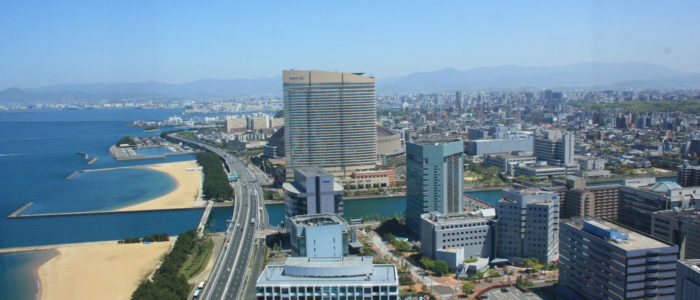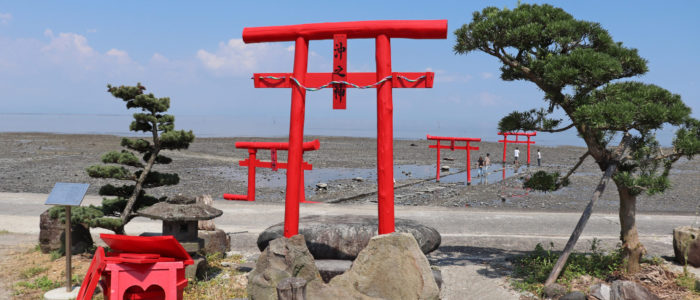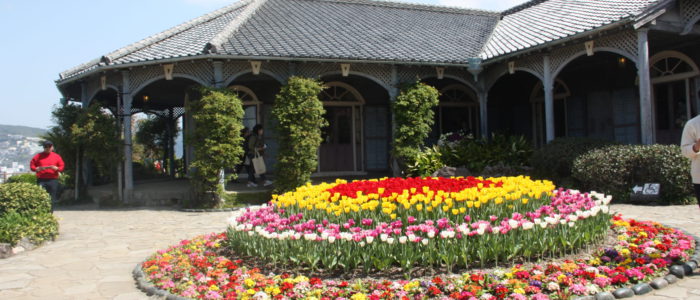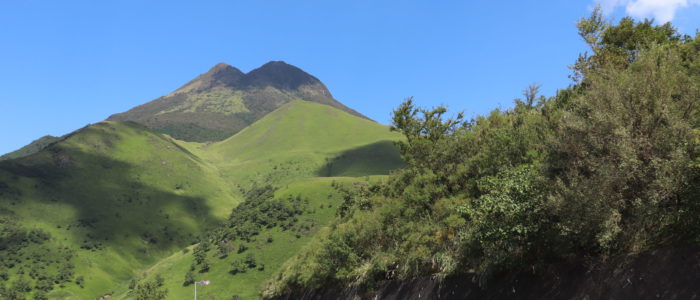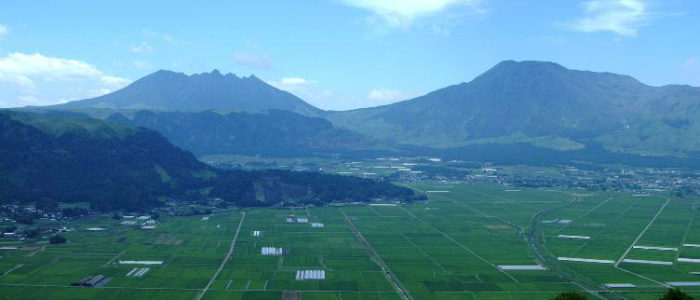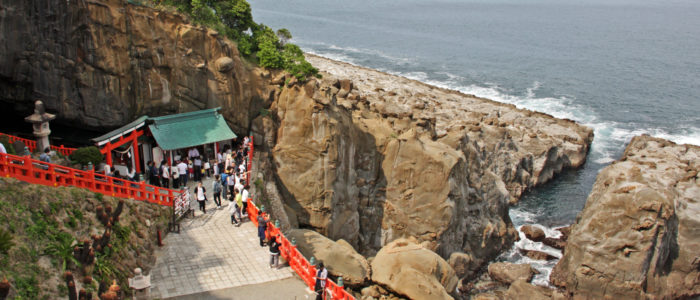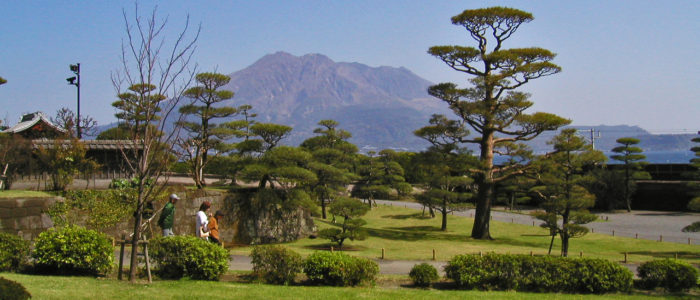Kyushu Travel Guide
This is the Kyushu tourist information that we have independently developed.
Getting to know your destination is the first step to planning a wonderful and an unforgettable
travel.
To help you plan an enjoyable trip to Kyushu, we have published the ‘Kyushu Travel Guide,
based on firsthand information and photos collected by us while visiting locations all across
the region.
Please feel free to explore and use it.
Kyushu is the southernmost of Japan’s four major islands, stretching 330 km north-to-south and
240 km east-to-west. It is separated from Honshu, Japan’s main island, by the Kanmon Strait.
Kyushu was formed by intense volcanic activity in ancient times, creating a landscape rich with
diverse natural beauty and Onsen (hot spring) to be enjoyed everywhere.
During the age of the Samurai, Kyushu consisted of nine separate domains. And many regions
prospered as international gateways to Asia and Europe. These diverse roots have fostered
unique local histories and cultures that still thrive across Kyushu today.
Thanks to Kyushu’s diversity, every destination offers unique landscapes, Onsen, history, and
local cuisine, as well as traditional architecture and deeply authentic Japanese experiences.
Fukuoka Prefecture
|
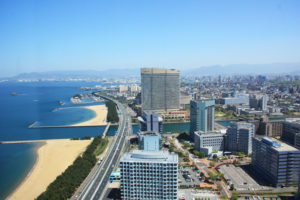
|
Fukuoka
As the biggest city in Kyushu, Fukuoka City is considered the gateway
to the country due to its close proximity to the Asian mainland. This
energetic and bustling city is the center of the region’s politics, economy,
culture, fashion, and tourism. With Fukuoka International Airport offering
direct flights from Asia, Guam, and Honolulu, the city serves as an ideal
starting point for your Kyushu exploration.
|
|
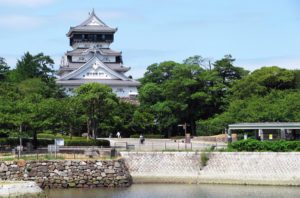
|
Kitakyushu
Kitakyushu is the second-largest city in Kyushu and possesses numerous
tourist attractions. Its natural areas include Mt. Sarakura, which offers one
of the most dynamic night views in the world. You can experience traditional
Japanese culture in the castle town of Kokura, explore Mojiko Retro facing
the beautiful Kanmon Strait, and visit the industrial area of Yahata, which
boasts many World Industrial Heritage sites.
|
|
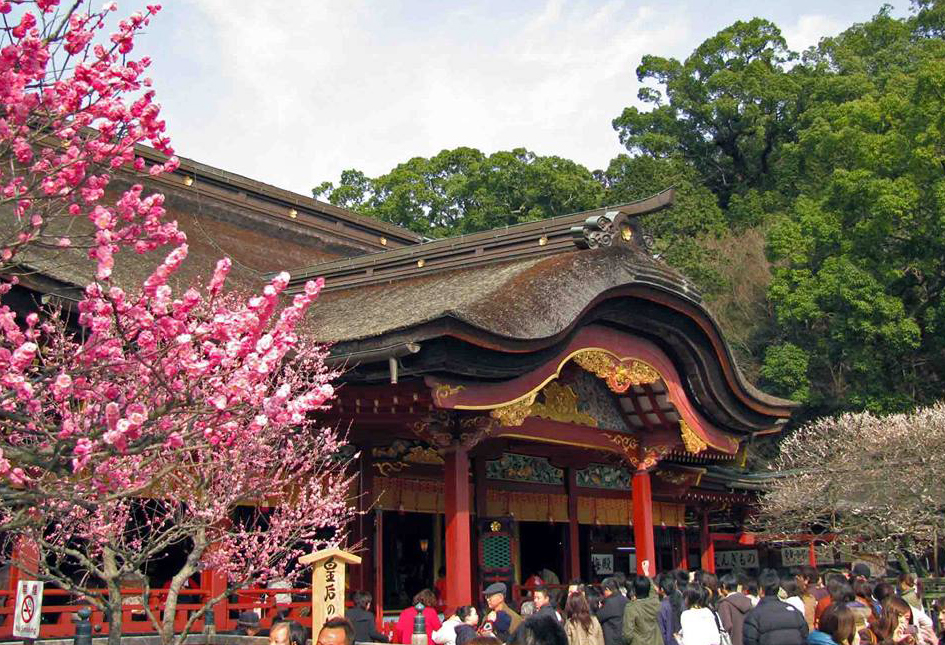
|
Dazaifu
Dazaifu is one of the most attractive tourist destinations in Fukuoka
Prefecture for experiencing traditional Japanese culture. From the late
7th to the late 12th century, it served as the “Western Capital” of Japan
and the administrative center of Kyushu. Geographically, Dazaifu was
the front line for Japan’s diplomacy and defense, as well as a primary
gateway to the Asian continent.
|
|
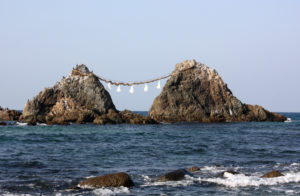
|
Itoshima
Itoshima is located next to Fukuoka City, with its north side facing the Genkai
Sea. It has beautiful beaches and an intricate coastline created by dynamic
wave activity. A plain and several low mountains lie between the coastline in
the north and the Seburu Mountain Range in the south, creating a serene a
ranquil landscape.
|

|
Yanagawa
Yanagawa is a beautiful canal town featuring flat fields that face the calm
Ariake Sea. The area was originally created through the reclamation of the
shallow sea, with a network of canals constructed for daily life and agriculture.
Once a castle town of the Tachibana Domain, Yanagawa is famous today for
its scenic canal boat cruises and delicious eel cuisine.
|
|
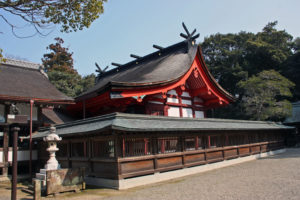
|
Munakata & Fukutsu
Munakata Region is located in the western part of Fukuoka Prefecture,
facing the Genkai Sea. It is home to beautiful coastal scenery and sacred
sites designated as a UNESCO World Heritage, titled “Sacred Island of
Okinoshima and Associated Sites in the Munakata Region.
|
|
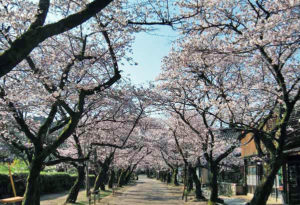
|
Asakura
Asakura is located in the south of Fukuoka Prefecture and spreads across
the Chikugo Plains of the Chikugo River basin. It is a thriving agricultural
area and possesses natural scenery that is rich and relaxing. The area also
includes the tranquil Harazuru Onsen resort on the river and the historical
Akizuki Castle Ruins.
|
|
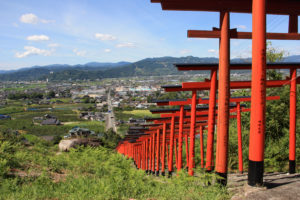
|
Ukiha
The most enjoyable experience is fruit picking throughout the year.
Ukiha is blessed with nature, where many orchards spread out at the foot
of the Mino Mountain Range. Yoshii, located in the center of Chikugo,
flourished as a post town during the Edo period. Today, there are a lot of
sake breweries in the area.
|
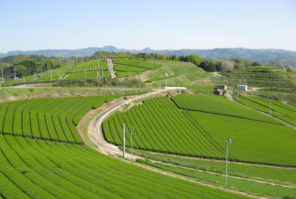 |
Yame
Known as the home of Japanese green tea, Yame is a tranquil rural region
famous for its tea cultivation and traditional crafts. For a truly special
experience, we recommend tasting Gyokuro tea – the highest grade of
Japanese tea – cultivated in the beautiful Hoshino Village.
|
Saga Prefecture
|
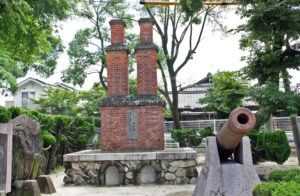
|
Saga
Saga Prefecture is situated on the Saga Plain, which stretches from the f
oothills of Mount Seburi down to the Ariake Sea in the south.
The region is home to the Yoshinogari Ruins, where rice cultivation in
Japan first began 2,400 years ago. Furthermore, the area made a great
contribution to the Japanese Industrial Revolution, serving as the starting
place of Japan’s modernization and industrialization.
|
|
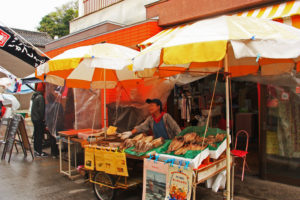
|
Karatsu & Yobuko
Karatsu and Yobuko, located on the Higashi Matsuura Peninsula in
northwestern Saga Prefecture, have flourished since ancient times as a
vital hub for trade with mainland China.
Yobuko is renowned for its fresh, translucent squid sashimi.
|
|
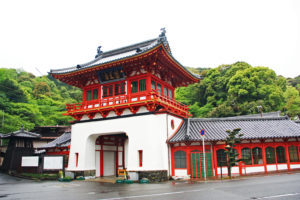
|
Takeo & Ureshino
Takeo, boasting a 1,200-year history, is located in western Saga, while
Ureshino is a renowned hot spring resort in the southwestern part of
the prefecture.
|
|
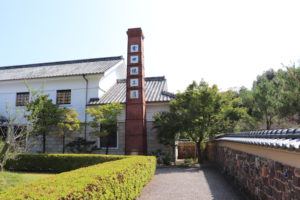
|
Arita
Arita is located in northern Saga Prefecture and is surrounded by mountains.
It was the first place in Japan to produce porcelain in the early 17th century
and is known as the birthplace of Japanese porcelain. These precious pieces
are famous for their bright, elegant designs painted on the translucent white
porcelain.
|
|
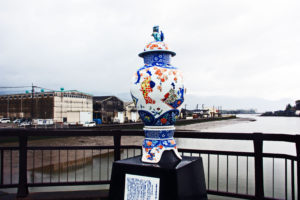
|
Imari
Imari is best known for Imari porcelain, which boasts a 400-year history.
The city borders Arita to the south and embraces the natural harbor of Imari
Bay. Nearby Okawachiyama is a famous pottery village; with its more than
30 kilns, it is a highly recommended place to visit.
|
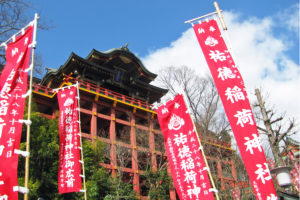 |
Kashima & Tara
Kashima is located approximately 60 kilometers southwest of Saga City.
The main sightseeing spot is Yutoku Inari Shrine, and visiting the local
sake breweries is also highly recommended.
|
Nagasaki Prefecture
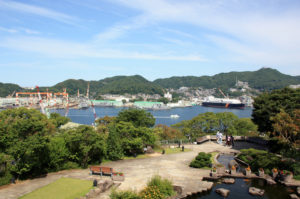
|
Nagasaki
Nagasaki City became Japan’s first international port city when its port
opened in 1571. As a result, it developed a unique blend of European,
Chinese, and Japanese cultures. The city offers many tourist spots each
with profound historical significance. Nagasaki served as Japan’s
gateway to foreign countries, the first area where Christianity spread,
and a key player in Japan’s industrial modernization. Sadly, it was also
the site of the atomic bomb used in WWII.
|
|
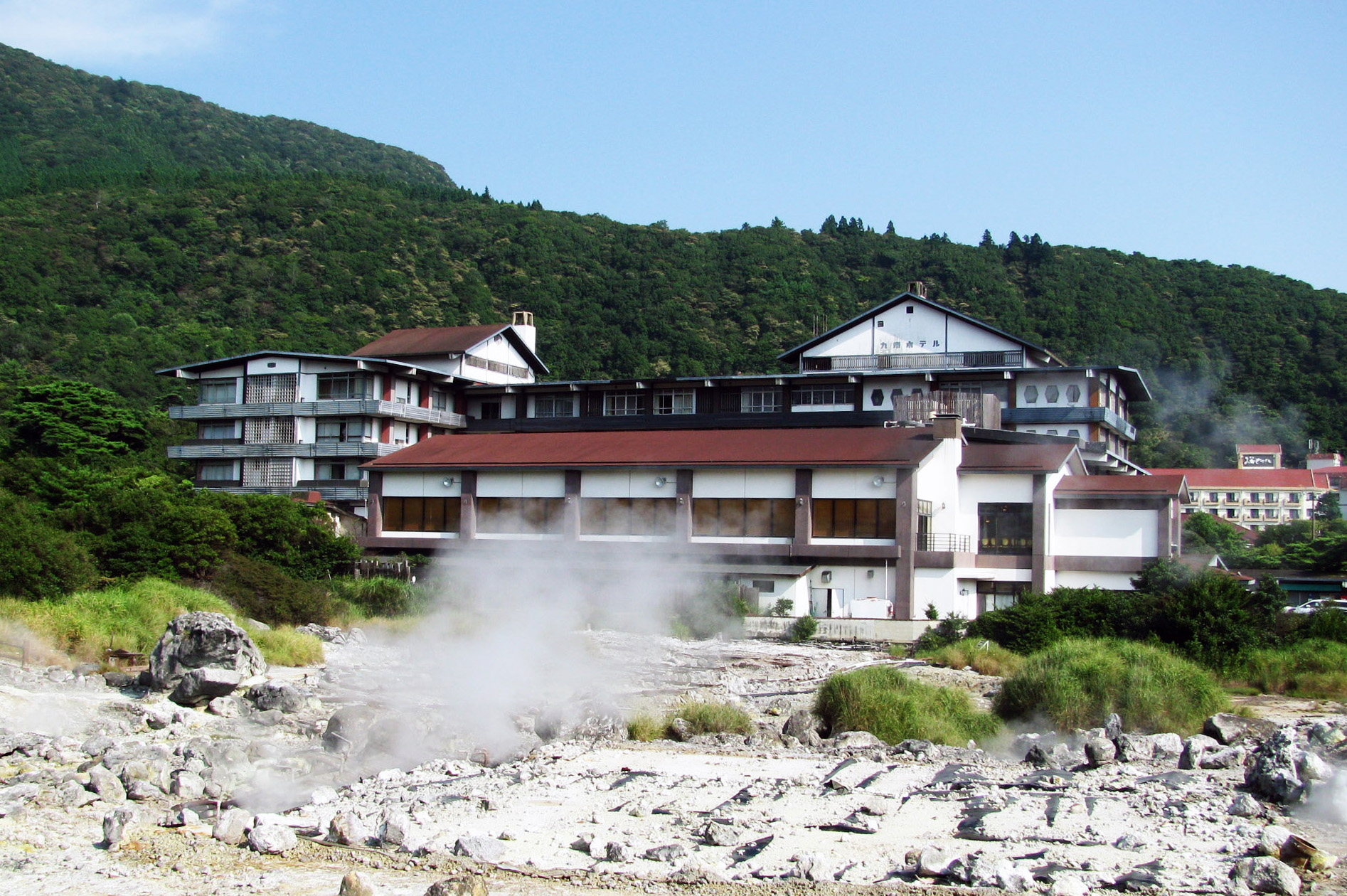
|
Unzen
Unzen is a picturesque Onsen resort located on the Shimabara Peninsula
and surrounded by the Ariake Sea. It is situated at an altitude of 700
meters within the Unzen National Park. The scenery of Unzen Jigoku
(hells) offers an otherworldly atmosphere, with white steam rising over a
wide area. The natural beauty of Unzen can be enjoyed year-round.
|
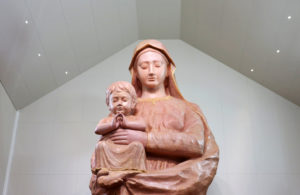
|
Shimabara
Shimabara consists of two cities on the Shimabara Peninsula: Shimabara
City on the east side and Minami-Shimabara City in the south. The region
offers various attractions, including beautiful nature, relaxing Onsen, the
historic castle town of Shimabara, and Christian pilgrimage sites in
Minami-Shimabara, such as the Hara Castle Ruins and the Holy Mary
Kannon.
|
|
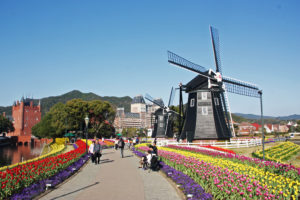
|
Sasebo & Huis Ten Bosch
Sasebo is located on the Kitamatsuura Peninsula and is famous for the
Kujukushima Islands, a beautiful area of numerous small islands often
called the “99 Islands.” Taking a cruise through these islands is a relaxing
and reinvigorating experience. Another must-visit attraction is Huis Ten
Bosch, a theme park modeled after a Dutch village. It faithfully
reproduces the charming streets and architecture of the Netherlands,
even including a stunning recreation of the Huis Ten Bosch Palace.
|
|
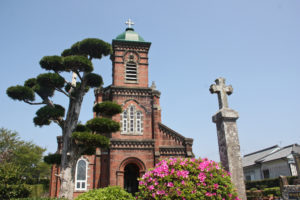
|
Hirado
Hirado holds a significant place in Japanese history as the first port
where Portuguese ships arrived in 1550. Shortly after, St. Francis Xavier
visited the same year, and Christianity was introduced to Japan here.
In the 1580s, the Portuguese established a trading post, soon followed
by the Dutch and the British. Hirado is located in northwestern Nagasaki
Prefecture, facing the Genkai Sea. The region is mainly composed of
the Kitamatsuura Peninsula, Hirado Island, and Ikitsuki Island, which
are connected by the Hirado Bridge and the Ikitsuki Bridge.
|
Oita Prefecture
|
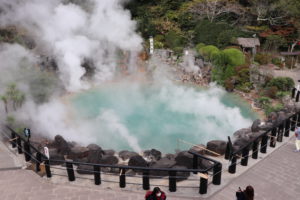
|
Beppu
Steam from underground hot springs rises everywhere in Beppu.
It is one of the most famous onsen resorts in Japan, located at the
foot of volcanic mountains, Mt. Yufu and Mt. Tsurumi.
The exciting “Hell Tour” (Jigoku Meguri) is highly recommended for
a unique experience.
|
|
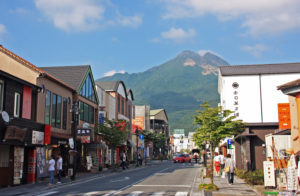
|
Yufuin
Yufuin is located in the Yufuin Basin and is a beautiful, tranquil Onsen
resort in harmony with nature.
Yunotsubo Avenue, Lake Kinrinko, and Yufuin Floral Village are all
worth exploring.
|
|
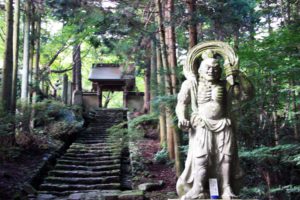
|
Kunisaki peninsula
The Kunisaki Peninsula is a rural area located in northeastern Oita
Prefecture. It is popular for its Onsen (hot springs) and trekking, and
visitors can also enjoy delicious local cuisine. The peninsula emerged
as a sacred religious site 1,300 years ago, deeply influenced by
mountain and nature worship.
|
|
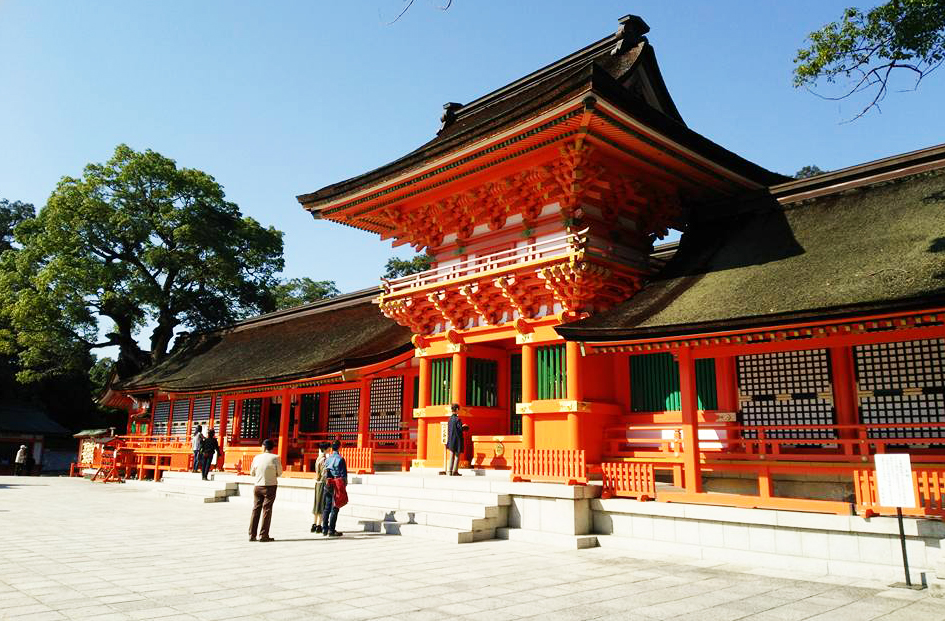
|
Usa & Ajimu
Usa and Ajimu are located at the base of the Kunisaki Peninsula, in
close proximity to Usa Shrine.
The area has long been sacred ground, known for the harmonious
blending of Shinto and Buddhist traditions.
|
|
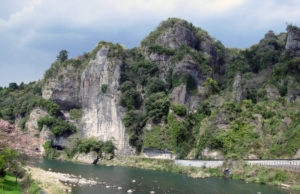
|
Nakatsu & Yabakei
Nakatsu flourished as a mid-sized castle town during the Edo period.
While the town itself has expanded in recent years to include
surrounding areas, its rebuilt castle remains a central landmark,
offering coastal views from its observation deck. The nearby Yabakei
area offers dramatic rock formations and relaxing hot springs nestled
in the valleys along the Yamakuni River.
|
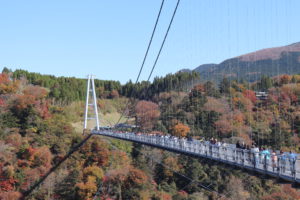 |
Okubungo region
Okubungo, also known as “Onsen country,” is a region blessed with
nature in the Ono River basin.
It is surrounded by the majestic Aso and Kuju mountain ranges to the
north.
|
Kumamoto Prefecture
|
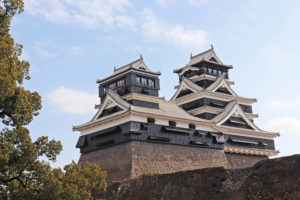
|
Kumamoto
Kumamoto is the third-largest city in Kyushu, ideally located in the
center of the island with the Aso region to the east and the Ariake
Sea to the west. The city is home to Kumamoto Castle, renowned
as one of Japan’s three premier castles. Visitors can also enjoy
shopping and local delicacies at the Shimotori shopping street,
one of the largest arcade districts in Japan.
|
|
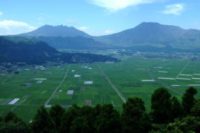
|
Aso
The Aso region boasts one of the world’s largest calderas, formed
by four periods of massive volcanic activity in ancient times. Within
the caldera lie the Five Peaks of Aso, including Mt. Nakadake-an
active volcano where visitors can view the crater up close
(subject to volcanic conditions). Daikanbo Peak, located on the
outer rim, is a must-visit spot that offers breathtaking panoramic
views of the five peaks and the serene green plains stretching below.
|
|
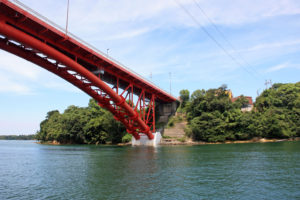
|
Amakusa
Amakusa is an archipelago consisting of numerous islands located
west of Kumamoto. The region features lush green landscapes and
unique geological formations, earning it the designation of a
“Japanese Geopark.” Visitors can enjoy various marine activities
such as dolphin watching and boat tours, as well as fresh seafood
and other local delicacies. Amakusa also holds profound historical
significance, particularly regarding its Christian heritage and
World Heritage sites.
|
|
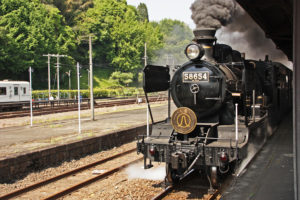
|
Hitoyoshi
Hitoyoshi is a historic castle town situated along the Kuma River.
Often called Kyushu’s “Little Kyoto,” it is renowned for its Onsen
resorts, ancient castle ruins, and thrilling river boat tours.
Visitors can also explore fascinating limestone caves, discover
the region’s rich steam locomotive heritage, and visit local shochu
distilleries.
|
Miyazaki Prefecture
|
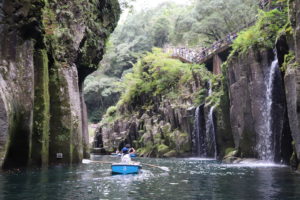
|
Takachiho
Located just south of the Aso region, Takachiho offers both
dynamic nature and a serene spiritual experience. The
breathtaking Takachiho Gorge was formed by ancient volcanic
activity from Mt. Aso. This spectacular, deep, V-shaped gorge
features impressive columnar joints, carved out over millennia
by the erosive flow of the Gokase River.
|
|
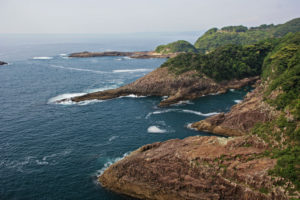
|
Hyuga
Hyuga is a bay-front city facing the Hyuga-nada Sea, famous for
its excellent surfing and beautiful seascapes. The spectacular
scenery features artistic columnar rock formations, sculpted by
years of weathering and the powerful, constant waves.
|
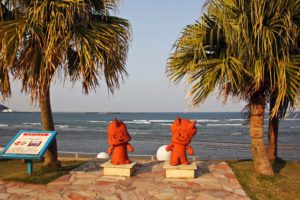 |
Miyazaki & Nichinan
The Miyazaki and Nichinan region, facing the Pacific Ocean, is
located in a subtropical climate zone. The landscape is stunning,
characterized by a beautiful combination of abundant sunshine
and ocean views. The area offers a variety of attractions, including
ocean resorts, unique wildlife habitats, and many historical and rel
gious sites such as ancient castles and seaside shrines.
|
Kagoshima Prefecture
|
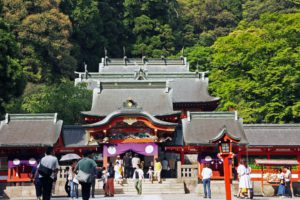
|
Kirishima
The Onsen resort region is located at the foot of the Kirishima
Mountains. Kirishima Jingu Shrine is one of the most beautiful and
mystical shrines in Kyushu, completely surrounded by a deep forest.
Visitors can enjoy scenic hiking trails offering spectacular mountain
views, and then relax in the area’s volcanic hot springs.
|
|
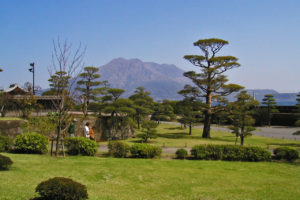
|
Kagoshima
Kagoshima is the southernmost major city in Kyushu. From here,
you can see Sakurajima Island and its active volcano, with plumes
of smoke and steam constantly rising across Kagoshima Bay.
The city prospered as a castle town during the Edo period, and
today, Tenmonkan serves as its largest shopping district.
|
|
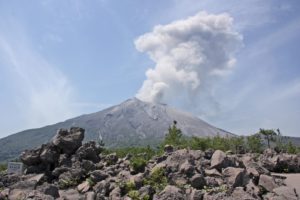
|
Sakura-jima Island
Sakurajima is the iconic symbol of Kagoshima. Plumes of smoke
and steam can be seen rising almost every day from the active
craters of Minamidake. Formerly after a massive lava flow filled the
channel between them. a true island, it became connected to the
Osumi Peninsula in 1914 After a short ferry ride from the mainland,
visitors can access several observation points that offer stunning
views of the volcano.
|
|
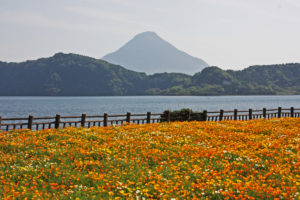
|
Ibusuki & Satsuma peninsula
Ibusuki is a renowned Onsen resort famous for its unique natural
sand steam baths along the shores of Kinko Bay. Located at the
southern tip of the Satsuma Peninsula, the area offers spectacular
ocean views and is a peaceful rural region known as the “home of
the sweet potato.
|
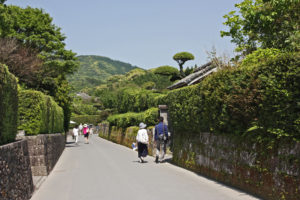 |
Chiran
Chiran is a charming town located in the heart of the Satsuma
Peninsula. Often referred to as “Little Kyoto,” it features a beautifully
preserved historic Samurai district with a collection of traditional
residences and gardens.
Another significant site to visit is the Chiran Peace Museum, which
offers a profound look into the region’s history.
|
Map of Kyushu
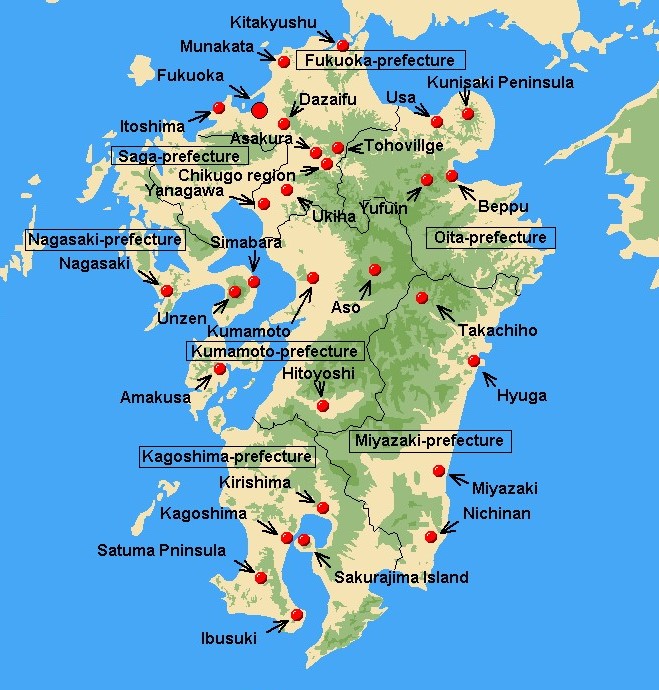
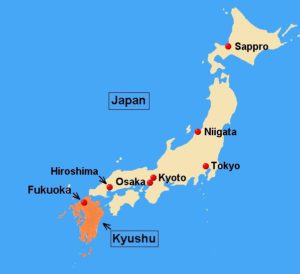
Home Customized Private tour Christian Pilgrimage tour Golf tour What our Guests have to say
-
Kyushu travel guide



